#it’s interesting how the theatre audience is thought of as the mass looking for thrills
Text
Le principe de la liberté littéraire, déjà compris par le monde qui lit et qui médite, n’a pas été moins complètement adopté par cette immense foule, avide des pures émotions de l’art, qui inonde chaque soir les théâtres de Paris. Cette voix haute et puissante du peuple, qui ressemble à celle de Dieu, veut désormais que la poésie ait la même devise que la politique : tolérance et liberté.
The principle of literary freedom already understood by the world of readers and intellectuals, was no less adopted by this immense mass, avid of the pure sensations of Art that flood every evening the theaters of Paris. This loud and powerful voice of the people that resembles that of God, wants poetry to have the same devise as politics: tolerance and liberty
Victor Hugo, preface to Hernani
#i get it i get it#i get hugolatry now#this is so good I would follow someone who spoke like this to battle#victor hugo#hernani#working my way through the manifestos of romanticism#the cromwell one has some great moments but i think this one’s better#there’s some elitism here#it’s interesting how the theatre audience is thought of as the mass looking for thrills#vs the readers and thinkers and high intellectuals#but i love that about the voice of the people being the voice of god#also censorship was intense in this era#it took balls to write this
6 notes
·
View notes
Text
Renegade Aeris x Cloud Week 2019 Day 1
Some of this was inspired by (no longer on Ao3) ‘Gossip Finds’ by icyboots - which, somewhat fittingly, turned out I had misremembered a number of details in the interim. Written for the prompt ‘OG Reminiscence’ and ‘One Scene’ (and not, you know, going with my original stranger impulse of something set in space in the far future onboard a ship named the OG Reminiscence): an AU of some sort:
The memory was oft-visited. This meant in turn that it was no longer authentic, or perhaps more accurately, it had acquired embellishments, edits, given a shinier veneer than the real. It was all too possible that rather than a singular version of the event in question, it was fragments of many different occasions, or perhaps mostly from one night with highlights for another. The recall and revisiting of the memory changed it over time. Impossible to prevent.
No matter; it remained one of Aeris’s favorites. The trip to the Gold Saucer had been part of a birthday celebration. Most likely hers, but even this detail was unclear. That was more the result of the alcohol than anything else.
The Gold Saucer was nominally an amusement park and to that end felt focused on a younger audience than Aeris’s twenty-two years accounted for. This was not quite correct. While the big attractions were family friendly (rollercoasters! Arcades! Overly gothic hotel!) there was amongst, beside and beyond those activities others intended for a more mature audience. Certainly the Chocobo Races while entertaining for the youngsters had its area set up specifically for wagers. Battle square was barred to anyone below eighteen – and few kids would ever find something of interest in amongst Dio’s massed collection of trinkets and artefacts.
Plus there were bars – were Aeris and friends had spent a good majority of their time before crashing into the theatre. In retrospect, and in the clear light of day, what was supposed to be happening in the theatre had a lot of question marks over it. Aeris was clear enough on what she did, where she had gone, how she wound up involved and the aftermath. But surely something was wrong? Had they somehow crashed some event while drunk they were not supposed to?
Not a thing to dwell on again. No memory of disappointed, angry adults and bawling kids as a result. But then- No matter.
The attendants had asked for volunteers and Aeris thought it sounded fun. She was ushered up from the crowd and backstage to the cheering of her friends. Did she have lines? She’d said something that sounded right. Maybe improvised. Maybe not. Either way she was taken up into the rafters and clipped into a harness alongside a bulky guy wearing a cartoonish dragon costume.
Below the play carried on to much raucous laughter from the audience. Another volunteer was on-stage – and from this vantage point – out of sight. He seemed to be taking this all about as seriously as Aeris; not at all. The cast did not help matters, leaving obvious loop-holes in his responses and actions.
“Seek out the one who can help you!” Boomed a voice over the loudspeakers.
“Hey.”
“I, um. Are you sure I, a mere knight, are the one who can help you defeat the Evil Magical Dragon King?”
“Yep.”
The audience chortled again. The man behind her murmured something; before she could parse his words, she plummeted to the stage alongside him, the harness not offering much of a break. Warm and bright out in front of the lights. To the back and right of the stage was a man dressed as a wizard looking off-stage while a woman with a headset mouthed instructions at him. Towards the front was a knight in tin-foil armour holding an exaggerated, uncomfortable pose of absolute horror. And right before her was a man with spikey blond hair and blue eyes. He grinned.
“Now, brave Sir Alfred, defeat the Evil Dragon King!” A voice boomed. The blond man pointed at himself. “Yes, you!” The man shrugged.
The wizard turned his attention back to the stage. “Um, the power of love will surely best the Evil Dragon King.”
The man met her gaze and smirked. Ah, a setup then. Hard not to feel a thrill as he walked towards her. This was a play, but by implication- Aeris’s friends were screaming their support from the audience. “Oh, oh Alfred, you came for me.” Corny line but about in keeping with everything else.
‘Alfred’ halted in front of her; she looked up. “Sorry princess.”
“Why, Sir Alfred, what can you possibly have to apologise for?” This was fun.
“Well.” ‘Alfred’ scrubbed at his hair. “Just, now standing here, seeing the two of you, I think I prefer the Evil Dragon King.” ‘Alfred’ leant past her to kiss the cheek of the costume. Aeris fault to hide her giggles even while she swooned. And here again a point where memory felt it must be fallible. How was it possible or plausible that the actors had prepared for this situation? No sooner had ‘Alfred’ completed his smooch when the Evil Dragon King was hauled up out of sight – and for a woman in a pink tutu to descend in his place.
“Why, thank you Sir Alfred! You have broken the dragon’s curse. Come, now we can live happily ever after.” The former-Evil Dragon King twirled her way off stage, followed by both ‘Alfred’, the wizard and the knight.
“Alas, the Princess was forgotten about by her knight.” Aeris grinned, folded her arms and assumed a stern expression. An angry foot stomp gained her a new wave of applause, and both the players and ‘Alfred’ returned to take a bow.
Aeris caught ‘Alfred’’s arm after. “Thank you for that. I had a lot of fun.”
‘Alfred’ grinned and there was some unimportant small-talk for a while. She learned his name was Cloud, and waved her friends off to their own devices when they grew bored. She and Cloud carried on talking, each trying to make the other laugh more. They meandered through the Gold Saucer, wasting a few gil on the chocobo races, on the arcades. The evening passed in a blur and one thing inevitably lead to another. Making out became more passionate. Passionate kissing demanded more privacy. And once in private, clothes were an impediment soon dispensed with.
And perhaps there could have been more there. If the night in question had not been Aeris’s last at the Gold Saucer. If transport was not arranged for so early the next morning. If she had not snuck out and not disturbed Cloud when her PHS rang and her friends hurried her to catch up or be left behind. What would it have been like to be left behind?
Another branch not taken in the ever diverging reality of her life. That was enough.
Aeris relaxed and lowered the sphere from beside her head. Captured within the crystalline structure was her memory of that night as of her last recall. A shame the capture could not have been made before. When the memory would have been truer. But did that matter? To relive was a delight and now she need not fear a failing memory as time passed. There were other memories to retrieve but- For now, something else. Aeris carefully laid the materia sphere in its container and headed for the garden.
#clerith#aerith gainsborough#cloud strife#final fantasy vii#final fantasy#aeris x cloud#my ffvii fanfic
1 note
·
View note
Text
Charlie Chaplin in Moscow
Early Soviet filmmakers took great inspiration from Charlie Chaplin, but his critique of mass production put him at odds with them.
In Charlie Chaplin’s 1914 film The Fatal Mallet, you can see “IWW” chalked on a wall in the background. While no one knows if the director — who grew up in south London’s slums and became a globally recognized comedian — supported the Wobblies at the time, we do know that the characters he played in dozens of short films in the 1910s and early 1920s would have.
In The Adventurer, he plays an escaped convict; in Police, an ex-con forced into burglary by unemployment; in The Bank, a janitor working next to, but unable to get ahold of, money; in Work, a downtrodden contractor; in The Immigrant, a migrant so frustrated by his treatment he kicks an immigration officer; and, of course, in The Tramp, a homeless man looking for a stable life. All these men, who populated the rapidly changing, expanding, and radicalizing United States, might well have written IWW on a fence in Los Angeles.
Chaplin wouldn’t state his politics explicitly until well into the 1930s, a move that would put him in the House Committee on Un-American Activities’ crosshairs. But in the aftermath of the Russian Revolution, young Soviet artists, designers, and filmmakers already thought they knew exactly what his politics were.
In 1922, the new Moscow magazine Kino-Fot, edited by the constructivist theorist and committed Communist Aleksei Gan, published a special issue on Chaplin. Throughout, painter and designer Varvara Stepanova depicted the actor as an abstract object, his body’s parts transformed into exploded shards and flying polygons, identifiable only thanks to his trademark hat, cane, and moustache.
Aleksandr Rodchenko’s text declares, manifesto-style:
[Charlie’s] colossal rise is precisely and clearly — the result of a keen sense of the present day: of war, revolution, Communism.
Every master-inventor is inspired to invent by new events and demands.
Who is it today?
Lenin and technology.
The one and the other are foundations of his work.
This is the new man designed — a master of details, that is, the future anyman.
That same year in Petrograd, teenagers Grigori Kozintsev, Leonid Trauberg, and Sergei Yutkevich, who collectively called themselves The Factory of the Eccentric Actor (FEKS), published something called “The Eccentric Manifesto.” Under the sign of “Charlie’s arse,” they demanded:
ART AS AN INEXHAUSTIBLE BATTERING RAM SHATTERING THE WALLS OF CUSTOM AND DOGMA. But we have our forerunners! They are: the geniuses who created the posters for cinema, circus, and variety theatres, the unknown authors of dust jackets for adventure stories about kings, detectives, and adventurers; like the clown’s grimace, we spurn your High Art as if it were an elasticated trampoline in order to perfect our own intrepid salto of Eccentrism!
Meanwhile, a film director was perfecting a technique that would eventually bear his name: the Kuleshov effect, in which the juxtaposition of unrelated material creates a new mental link between them. He argued against slow paced, European montage, which treats cinema as a high art form akin to theater, and for the high-speed American montage that thrilled audiences.
Somehow, these people, all trying to create art in the young Soviet Union, agreed that Chaplin represented their ideal. In a series of theatrical productions and films over the next decade, they would try to make something that had the same effect on their viewers — a socialist, avant-garde slapstick comedy, informed by silent farce, technological romanticism, and contempt for high culture.
This history sits a little strangely with what many know about the Soviet Union’s first fifteen years of experimental filmmaking. Its directors, including Sergei Eisenstein, Lev Kuleshov, and Vsevelod Pudovkin as well as documentary pioneers like Dziga Vertov and Esther Shub, have earned formidable reputation for applying Marxist methodology to film.
Their contributions, including “the montage of attractions,” the “camera eye,” the “intellectual montage,” and the aforementioned Kuleshov effect, have grounded film curricula since the 1960s, often used in contrast to Hollywood’s formulaic spectacles. In fact, when French filmmaker Jean Luc-Godard stopped making crowd-pleasers in the 1960s and opted instead for punishing Althusserian didactic tableaux, he signed his films Dziga Vertov Group.
What this story leaves out is how Soviet directors’ ideas came out of their obsessions with the crassest and most lurid kinds of American film, its chases, special effects, and pratfalls. In translating Chaplin for Lenin, they combined these elements with their equally strong interest in another aspect of 1910s America: scientific management and industrial efficiency, especially the work of Frederick Winslow Taylor and Henry Ford.
The resulting films shared a bizarre and unstable comic Americanism, which you can see still in films like Kuleshov’s Adventurers of Mr West in the Land of the Bolsheviks, a high-speed, Keystone Kops satire about Western perceptions of the Soviet state; Boris Barnet’s Miss Mend, where an international communist secret society foils the evil plans of nefarious capitalists; Sergei Komarov’s A Kiss For Mary Pickford and Pudovkin’s Chess Fever, which used footage of American stars on Soviet visits and put them into new, bizarre farces; and Eisenstein’s first feature, Strike, where insurgent workers move with all the bounce and assurance of a mass circus troupe.
Stage director Vsevelod Meyerhold helped pioneer this style. From the early 1920s onwards, he developed a “biomechanical theater” that borrowed equally from the circus’s high-wire tricks and gymnastic leaps, from Charlie Chaplin’s and Buster Keaton’s jerky, ironic slapstick, and from the USSR’s development of Taylorism, led by government-sponsored think tanks like the League of Time and the Central Institute of Labor. The latter’s founder, Aleksei Gastev, a former metalworker, union leader, and poet, became a key figure for most of the 1920s avant-garde.
Looked at coldly, his ideas are unnerving and dystopian. He imagined the new Soviet working class as nameless machines working in seamless unified motion, a somewhat unlikely and wholly unfulfilled demand of the chaotic, largely rural, and unskilled labor force of the Soviet 1920s. Yet while Taylorism involved monitoring the worker’s motions to transform them into a predictable, high-performance cogs, Meyerhold’s biomechanics saw its protagonists as Chaplin-like comic machines, capable of humor and exuberance, not drab labor.
This appears even more strongly in another form of Soviet Chaplinism, which comes from an unlikely direction — formalist literary criticism. The great Viktor Shklovsky used Chaplin as an exemplar of his concept of “ostranienie” or “making-strange.” In his 1922 Literature and Cinematography, he tried to work out what set Chaplin apart from other actors, finally deciding that “the fact that [the movement] it is mechanized” makes it so funny.
In the American context, Chaplin was satirizing industrial, mass-production labor, but in the Soviet landscape — destroyed by seven years of war and economic collapse — the little tramp who moved with jerky assurance through a mechanized world was exactly the sort of “new man” they needed.
American visitors found this all disconcerting. The sympathetic artist Louis Lozowick had to explain to eager young constructivists in Moscow that he didn’t know anything about biomechanics, and that they, the Russians, had invented it themselves. A Ford Motor Company representative, treated by his hosts to some biomechanical theater, thought the whole thing ridiculous and farcical.
In the mid-1920s, the Soviet Eccentrists would move away from the leaps, special effects, and extravagant silliness of movies like The Adventures of Mr West and develop a more sober style, although equally indebted to the frantic pace of American montage and cartoonish American acting styles. The results, such as Eisenstein’s Battleship Potemkin and Pudovkin’s Mother, had a mixed reception in the USSR but became international sensations. Their kinetic action sequences changed cinema history, and their rousing revolutionary narratives got them banned across the free world.
This is when Charlie Chaplin first became aware of his Soviet fan club. He opposed the bans and helped get these films shown to American audiences. When Eisenstein made an abortive attempt to film Dreiser’s American Tragedy in Hollywood, the two directors became fast friends. But the Soviet film director who had the strongest effect on Chaplin — whose feature films like The Gold Rush and City Lights had become ever more sophisticated and socially critical — was Eisenstein’s great adversary, Dziga Vertov.
A groundbreaking documentarian, Vertov thought fictional films were inherently bourgeois and escapist. Nevertheless, his special effects, comic juxtapositions, and pounding sense of rhythm made him an Americanist in his own way. In 1930, he made the first Soviet sound film, Enthusiasm — Symphony of the Donbas. This hour of grueling industrial propaganda doesn’t much resemble The Fatal Mallet. It depicts mechanizing the Donets coalfield in Eastern Ukraine and teaching the mineworkers Taylorist efficiency.
Chaplin, however, was attracted to the unrivalled intensity of its juxtaposition of sound and image. Using field recordings from Ukraine’s mines and steelworks, Vertov created an industrial jazz of still-astonishing power, a relentless clanging pulse echoing that puts the soundtrack closer to Einsturzende Neubauten than to Al Jolson. Chaplin called it “one of the most exhilarating symphonies I have ever heard.”
Six years later, he made his response. Modern Times has become justly famous for its definitive critique of Taylorism and Fordism. In the factory sequences, machines feed Chaplin, his all-seeing boss monitors him on film, and the production line eventually eats him, until he floats, weightless, through the cogs inside, a tragic and bitter image of the smooth and seamless mechanized labor the Soviets longed for. Insisting on keeping the film wordless, Chaplin used a soundtrack of rhythmic clangs and crashes that mirrored Vertov’s “Donbas” symphony.
Coming when Taylorist speed-up was sparking some of the greatest strikes in American history — not to mention the CIO’s formation — you might expect that the Soviets welcomed the film as a critique of American capitalism’s brutality.
They didn’t. In a text called “Charlie the Kid,” Eisenstein criticized his friend for his satire’s infantilizing and utopic take on what mass production does to workers. Regarding the factory sequence, he asserted, “At our end of the world, we do not escape from reality to fairy-tale, we make fairy-tales real.”
The tramp of Modern Times, exhausted by labor and made homeless by unemployment, accidentally picks up a red flag midway through a strike, getting him arrested as a dangerous agitator. Chaplin himself would be notably supportive of the Soviet Union, and his refusal to fall in with McCarthyism was admirable; but the tramp might have silently held other opinions about industrial efficiency and five-year plans than those he helped inspire.
0 notes
Note
write more about the aia you saw and the actors
fuck
so the production was excellent. that’s the word i’d use, not perfect, not mind-blowing, not even first-rate, but like, super, super good, very professional, very slick, very tight ensemble work, wonderful performers. the thing with actor’s theatre louisville is they have a lot of money, and i feel like they had to appeal to a wide audience of subscribers, so they really played up the humor (and there IS a LOT of humor in angels) and made the lines LAND, sometimes as if they were harvey fierstein one-liners. i liked hearing it like this, say, 75% of the time. but in other places, i felt like this land-the-joke direction robbed the text of its sincerity. for example, the line about “the white cracker who wrote the national anthem…” got a big laugh? which i’d never seen before? i think that line is so devastating? but it’s a sassy gay black man* being like “white people, am i right?” toward a white audience so i feel like the general reaction was like, white liberal self-awareness or something. idk. i was surprised at the laughter.
*i don’t mean to diminish the actor’s fantastic performance, which i’ll get into later. belize is obviously so much more than a sassy gay black man. but he is still a sassy gay black man, and i suspect that unfortunately, some of the audience didn’t allow themselves to see past that stereotype.
wait, okay, you must understand the state i was in, seeing this play. the night before i had gotten super drunk, made out with a stranger at a club, and then gone to bed at 4 am. i unfortunately and unintentionally woke up at 8 am because i was staying in one of those apartments where the sun comes up RIGHT in the window and there were no curtains and i could not get back to sleep. so i had a cup of coffee in the morning, and then by the time the first intermission happened, it wore off, so during the dinner break i got a gigantic espresso drink (blackberry and something? it was fucking amazing) and chugged the whole goddamn thing with my salad and poutine fries. point is, i was really pushing my body to the breaking point, which made this whole experience extra emotional.
okay. i cried four times in the first half. the exchange “let go of my arm, “no,” let go,” “no” makes me sob every single goddamn time, i find that to be consistently the most heartbreaking moment of the show.
other moments were “i want louis, i want my fucking boyfriend, where the fuck is he?”
i think another one was “deep inside you, there’s a part of you, the most inner part, entirely free of disease”
and the other moment that BROKE me was louis rising up from the ground in a tux and then him and prior dancing to moon river. i feel like i was prepared for the moment, i knew it was coming, but as soon as louis rose up i heard a few girls be like “awwww,” it was clearly their first time seeing it, and it just completely fucking broke me
i only cried once in perestroika. and like the “let go of my arm” exchange, it’s the part that always breaks me: “we won’t die secret deaths anymore.” i can watch most of the last scene and be totally fine but that last line always does me in. i can’t even talk about it without getting choked up.
gosh, okay, individual performances i guess?
barbara walsh was exactly as fantastic as i suspected and hoped she would be.
i always worry that i can’t get past al pacino’s amazing performance as roy cohn but then nathan lane proved me wrong and then this actor also proved me wrong.
belize was the STRONGEST belize i’ve ever seen. you do not. want. to. fuck. with. this. belize. part of it was his body, i think, he was super tall and muscular and carried himself with weight, and he was so determined and confident. it’s easy to fall into sissy-boy cliches when playing belize, i think, and he went in the opposite direction. he was still SUPER gay though, of course. wouldn’t wanna lose that. brilliant choices, brilliant performance.
louis!!!! louis was SO SO SO smarmy, and borderline manic, and so fast-talking and energetic, and it was probably the most detestable louis i’ve ever seen but also the most goddamn fun to watch. he was so engaging for every single line (and it’s easy for me to lose interest during his coffee shop scene with belize, among other parts). bravo.
harper was amazing, i don’t really remember too many of her choices though? joe was fantastic too, probably the most understated in the cast, and less *sexy mormon* than i’d seen before. he looked the most like a real person you’d see and forget. the woman playing the angel was completely fabulous, had a bit of a hoarse voice which was probably from all the shouting she’s been doing in this play but it really worked.
who am i forgetting?
WOW I JUST CONSULTED THE PLAY TO SEE WHO I WAS FORGETTING AND IT’S LITERALLY PRIOR CAN’T BELIEVE MYSELF okay yeah prior was amazing. i do think he sold the humor in a more unexpected way than all the other actors? and frankly the final scene didn’t wreck me as much as i’d hoped (until that one line), i think because he kept changing his inflection as a way to keep the audience engaged and not fall into monotone? again, playing toward the masses, occasionally to the detriment of the beauty in the text. also there was no underscore in the last scene which i felt was weird.
the music! there was original music, i liked it, but not as much as i liked the music in the columbus production i saw. miniseries music > short north stage in columbus music > actor’s theatre louisville music > national theatre music.
one more thing that struck me as odd and then i have to take a shower and get ready for this punk show i’m seeing tonight okay. so the tell me more about justice/trooper of the month scene between louis and prior in bed has always been a somewhat sexually charged scene to me. it gets sad, of course, but the sexual undercurrent has always sort of emphasized the tragedy for me? i could get more into it but i won’t now, point is, they were wearing pajamas. i thought it was weird that they weren’t in their underwear. i think it diminished the impact of the scene and also do gay male adults actually lay in bed wearing pajamas??? i don’t believe that
and that choice was even WEIRDER when act two started, the scene where prior is crawling on the floor, it’s supposed to be viscerally horrifying, right? but he was stripped down to his white briefs, and it was the first time the audience saw him in his underwear, and he was completely fucking ripped and hot as hell, and i was like this is completely the wrong time to notice how sexy he is lol? i think it was a bad choice.
OH i already said “one more thing” but the angel crashing through the roof was fucking amazing. so like, dracula, the show they do every october for the past 22 years? i saw it, it was fantastic, and it was all the spooky smoke and mirrors and lights and flying and just super fun immersive high tech experience it has the reputation for and i thought it was thrilling. and this production used a lot of the same technical magic, especially when the angel crashed through the roof, she actually CRASHED and bits of the roof fell on the stage and i was fucking thrilled, it was equivalent to seeing the chandelier fall in phantom of the opera, but obviously with more meaning.
i’m not going to edit this post, i have to go do shit. but it was amazing. can’t wait to see a third and fourth and fifth production of this play.
21 notes
·
View notes
Text
Interview with David Furlong, director of THE FLIES By JP Sartre
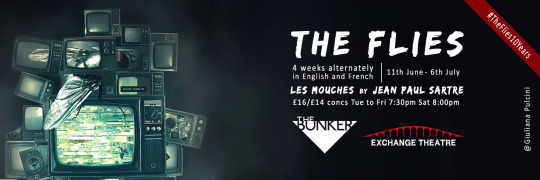
The director chatted to us about his production of Jean-Paul Sartre’s play The Flies, playing at the Bunker Theatre from the 11th June.
Hi David, could you tell me a bit more about what The Flies is about?
In The Flies, one of the most famous French philosophers, Jean Paul Sartre, provides his take on the Greek myth of the Oresteia: Orestes returns to his birthplace to find his sister Electra reduced to be a servant, and his mother ruling the land along with her lover Aegisthus, a dictator. Sartre tells of the guilt imposed on a whole people through misinformation and ignorance. The flies, hovering around the stench of the city, symbolize the fear maintained through remorse and manipulation. In our version, it’s a thrilling dystopia fusing vigorous theatre with the energy of a live rock band.
What attracted you to bringing Jean-Paul Sartre’s play to the stage?
The Flies is a play of rebellion, written by a young Jean-Paul Sartre against Nazi Occupation in France, and this ode to freedom still rings today like a wake-up call. Eighty years later, far right populists are rising again promoting fear of the other, of any differences. Sartre’s play is so relevant. Also, The Flies is the show which put Exchange Theatre on the British theatre map ten years ago. Before this show, we were barely surviving through guerrilla theatre-making on the Fringe. This is the show that brought us a three-year creative residency at the French Institute, and subsequently our own studio-space in London Bridge, where we are still based. We passed our ten year anniversary two years ago, just when the Brexit vote happened, and when we got our first of three Offies nominations. It was a very polarized moment. It’s like being told both you’re welcome and you’re not in the same week.Now that we’re a more recognised company, and have also become a charitable organisation, it seemed logical to revive this landmark show to celebrate our first decade, but also to take a stance on the current political climate.
How did the concept for the production come about?
The Flies contains everything Exchange Theatre is about: it is a rare and major foreign play brought to the English audience, it’s multi-disciplinary mixing video artists, live musicians and theatre, and its cast represent numerous nationalities and minorities on stage. It’s all about the exchange at the core of the company. When we first produced the play ten years ago, it was right after our first experiment with a live guitarist incorporated in, but the idea was to use his music not just as transitions or score but playing like a character simultaneously with the actors. The guitarist and I immediately thought we could do it with his full band, A Riot in Heaven. The Flies seemed the best project, as it needed a permanent buzz, and also a supernatural element in Act 2, with a booming bass. The music itself and even all the required cables also happened to be a great set to enter into our post-apocalyptic world, built on the electrical debris of our society. Music triggers the audience’s imagination and creates our world.
Why would you say the play is relevant in 2019?
Our set is made of piles of TV sets, on which publicity and propaganda is broadcasted, representing the fake news deployed to keep the citizens of Argos in ignorance and fear. This Orwellian world is never very far from ours. In 1939, The Nazis and the French collaborationists spread their ideology like this. In 2009, the lies were about the weapons of mass destruction, and in 2019, it’s about promoting isolation and closing borders in the name of the people. The mediums have changed but the propaganda and the struggle against it are both the same. Sartre’s existential philosophy is universal and timeless as it always questions the status quo, and it asks the eternal question of what it is to be free.
What can audiences expect from this production?
Our primary objective is to refresh Sartre’s play so that it is rediscovered for twenty first -century eyes and ears. The direction, the scenery, and every musical or visual invention make the show an immersive sensorial experience. The immediacy of the guitars make the audience feel the performances deeply. Someone wrote about the show after its first creation that it was ‘total theatre’ and The Scotsman that it was “amazingly intense”, which we were quite proud of. And it’s also quite a fun and enthralling evening with surprising rock songs made with Sartre’s lines!
What are you most looking forward to about bringing this production to the Bunker?
Some of the most interesting questions have recently been raised in public debates: how do we represent diversity, gender-parity, equality or equity, and disability on stage? All of these questions are at the centre of our practice and suddenly we’re facing almost all of them in the creative process of The Flies. It’s an amazing challenge to look at them with more maturity and responsibility. We’re excited to work with The Bunker: Chris Sonnex, the artistic director, and David Ralf make it one of the most exciting and daring venues to be working with, and to tackle all these subjects with. The most exciting thing for us is to be making the show for you !
By Emma Clarendon
0 notes
Photo

Mat Fraser
Article by Lauren Weigle
A quick chat with the amazing Mat Fraser. If you don’t know him, read this then LOOK HIM UP.
What advice do you have for up-and-coming artists with disabilities who aspire to succeed in the entertainment industry?
Be prepared for NO, but keep going until they give in. Be better at what you do than your non-disabled counterparts and you might just get seen as almost as good. Fuck the system, but if you ain’t mainstream success, to some extent you have to behave as if you love it. Don’t use your disability to get away with lack of talent, bad behavior, mistakes, and other human attributes. But, by all means, use it to perform, make yourself more interesting, and recognize the duality of being different in as positive a way as you can manage. It will help.
Can you provide us with a little background on your life prior to becoming a performance artist?
Normal school; got expelled for too much sex, drugs, and rock and roll; 16 years professional rock drummer in bands like Living In Texas, Joyride, and The Grateful Dub. Then I got my disability consciousness and became a performance artist, actor, writer, poet etc.
As a triple threat rock musician, performance artist, and actor, which of the three are you most passionate about and why?
Well, all of them...but I guess portraying disabled characters that reject the tired clichés of “Hollyweird”, showing us to be the full gambit of possibilities that we are. That gives me a thrill.
You also have passions for martial arts, writing poetry, and radio. Can you elaborate on these hobbies for us? Also, do you have any additional interests that you enjoy?
Well none of them are hobbies. I am a martial artist which is a way of life. Radio, I do professionally for the BBC, and I still occasionally write poetry, but I prefer scripts these days. One day I’d like to write a whole play in modern verse.
For 15 years you were a drummer for several rock bands. Would you mind telling me about your experiences with these groups?
Sex, drugs, rock and roll, occasional groupies, and more drugs. I had a great time in Living In Texas, signed to EMI France, and was on day-time TV. We had a big LP, spent lots of money, and then were dropped by the label. We toured a lot in 80’s in Europe, then 90’s in Europe, and Sweden until we settled in a speed metal band/dub reggae band in Brixton, London. Happy, simple days of maximum partying.
That sounds insane! What are your personal opinions about touring and have you given any thought to performing with a band again in the future?
I would love to. In fact, I’m trying to put together a Cramps/Velvet Underground tribute band, made up of freaks and tattooed girls, called The Spazms. Touring has its own rhythm, and once seasoned in it, you can learn to really enjoy its fun...lack of sleep, good food etc. These are the down sides, but still worth it all.
Well, after those crazy and successful days as a drummer, you expanded your musical stylings to rap and speaking poetry, recording several albums. Tell us more.
I wanted to SPEAK to people, tell them how shit I thought everything was, and communicate my disability in society angst to the world. It never occurred to me how ludicrous that was: a white, middle-class, disabled, old rapper from Britain. I liked what I did though, and did 2 LP’s full of my vitriol and rhythms.
Well, aside from your talents as a musician, you have a few fun projects you are involved with right now including hosting at The Slipper Room, various burlesque shows throughout Manhattan, and the Coney Island sideshow. Could you give us some more details about these events?
Well, I regularly host the Slipper Room shows now. I get on with their house style and like to bring my mutated sideshow humor to bear on the bare. The sideshow itself is a great place to hone your performance skills and find out who and what you are as a disabled performer. I love working there and hope to be able to do a lot of next year’s summer season. That also goes for the occasional flash style performances I’ve been involved in, in NYC. I love the openness of possibility there.
In addition to these shows, you have Beauty and the Beast coming up, in which you are accompanied by Julie Atlas Muz. Can you describe the show and your performances to first-time audiences for us?
It’s between theatre and Live Art, it’s a child-like story for adults, it’s the ultimate romance, and it’s quite nude, but not rude. It makes people cry, cheer, and standing ovate. An hour long, we interpret the classic story to inhabit the Oedipal transfer and the equation of mutation as beastly, to find true love only can be free when one is free of all trappings of so-called “prisonesque” normality.
How do you handle mistakes during a public performance?
Treat it as a lesson, be focused enough to not let it happen again, but don’t kill myself with remorse.
Was creative performance always an aspiration for you?
It’s my life, indeed. I am stared at 24/7 in my life. To be able to control the nature of that attention is a wonderful gift, catharsis, therapy. But, most of all, it is power, the power to transform people’s minds and ideas, to help them open up into more knowing beings, and to enjoy life. I get all that and loads more by being a performer; so of course, it is the only way for me to go. The alternative is being unable to change the misconceptions and prejudices about disabled people, which I have no interest in or time for.
What kind of parts do you prefer to play in terms of your roles or gigs as an actor?
Anything at all, but I love it when it has nothing to do with my disability...however I also love it when it’s integral. These days I enjoy comedy and character roles.
Well, since we’ve been talking about your disability…being born with phocomelia, can you provide us with a little background on how life for you differs from those who have been born without this syndrome? And, can you briefly describe phocomelia for those who are unaware?
It means seal-like limbs, which is fairly descriptive because our limbs do look a bit like flippers of seals, especially in X ray format...you can see the bone structure is flipper like...The differences I have encountered growing up are less about how I manage to dress and wipe my ass etc., but more about the social stigma of being extremely physically different and the negative assumptions/reactions you get from the general masses. Most of the time they are lovely, but not always. Dealing with that and processing how to manage it all while remaining sane and functional has been what growing up was all about for me.
How has living with phocomelia affected your being a drummer and performance artist?
As a drummer, merely physically, in that I had to literally reconfigure the drums’ positions in order to play them well. As a performing artist, they have been my inspiration, my reason for becoming a performer, so living with them has been a joy.
Now, how about a few random questions? Can you tell us a bit about the most memorable film or television production in which you have participated or acted?
My film “Unarmed But Dangerous” was incredible. It cast me as the action hero, “Bruce Willis with flippers”, as it says on the back of the DVD. Really violent, underground sicko, British gangster film…I loved it. Then, the big TV series came out in the U.K., “Cast Offs”, because I have a big part and get to play a really complex character. And, because it is seminal in that all 6 main characters are disabled and moreover all played by disabled actors…Never happened before.
To you, the word “success” is defined as what?
Fiscally independent sanity, smothered in universal love.
Any last words?
Get me a drink!
0 notes
Text
Bitched Dramaturgy: Juliet Knight @ Kali
KALI THEATRE COMPANY presents
the premiere of:
‘BITCHED’ by Sharon Raizada
A pacy, sharply observed contemporary drama about
relationships, marriage, children, careers and having it all…or not…
October 25th-November 11th – Tristan Bates Theatre, London WC2
‘Bitched’ centres on the relationships and everyday lives of two vibrant couples: Rob and Ali, and Suzanne and Nirjay. The tangled subjects of love, marriage, parenthood, responsibility, ambition and careers are aired and debated in an often heated atmosphere amid polarising views and changing circumstances.
Will the couples stay together despite their differences…will they be able to balance parenthood, marriage and careers…will chasing the dream affect everything else…or will they somehow find a path to equality and happiness…Raizada asks all these questions and more.
What was the inspiration for this performance?
JULIET KNIGHT: As a working mother I have wanted to work on a project exploring motherhood for a long time so I was really excited when I read Sharon's script. My relationship with the themes of the play was deeply rooted in my own experience of juggling motherhood and work for the past sixteen years.
As a theatre maker I really thrive on collaboration so was excited to literally start on stage with a blank canvas. Exploring artists like Tracey Emin sparked the idea of a stage scattered with the cluttered life of a working mother; and Mary Kelly’s seminal 1972 short film Nightcleaners Part 1 made me very clear that the aesthetic for this piece of theatre would use realistic domestic items and stylised physical sequences to create the work of art.
.
Is performance still a good space for the public discussion of ideas?
JULIET KNIGHT: The story of Ali (‘Bitched’ protagonist) sees the journey of a financially dependent people-pleasing wife/mother to a self sufficient, financially independent working single parent. By following this story and facing uncomfortable portrayals of women and how they treat each other the audience are
invited to ask questions.
I am looking forward to fellow parents from the school gates seeing this production. Something in the live nature of theatre and chats in a bar after feels good for the soul. I spend a lot of time with a screen these days so I feel gathering around a stage and being part of a collective is what we need more of.
How did you become interested in making performance?
JULIET KNIGHT: As a kid I loved old black and white films. When I look back I realise I've always found great comfort and inspiration in stories. I trained as an actor and while I loved performing in my 20s, I started to enjoy the creativity of shaping and building a show. Finding the right piece of music to tell the story or watching actors discover their characters through an improvisation became joyful.
Is there any particular approach to the making of the show?
JULIET KNIGHT: I do not decide what the actors will be doing before I begin a process. I like to be brave enough to trust that the real discoveries that make a show have pieces of magic happen in the room.
One thing that excited me on ‘Bitched’ was when I set up a long improvisation with the actors and a room full of objects. I allowed them to go through an imaginary day in the life of their characters. Watching this improvisation fed into all the physical moments and helped to bring a playfulness to the text.
Does the show fit with your usual productions?
JULIET KNIGHT: I find myself working mostly in new writing or using theatre as a form of social change. Creating work at the women’s theatre company Clean Break with women who have been in the criminal justice system and working with organisations that engage vulnerable young people has shown me how powerful the arts is.
Last year I directed a show in Thameside Prison in south east London and watched the male prisoners engage, respect and create a professional production. The ethos of Kali and giving South Asian women a voice is something I feel proud to be part of.
What do you hope the audience will experience?
JULIET KNIGHT: I hope the audience will care about the female characters. I hope they feel the struggle of the characters and most importantly I hope they ask the question of whether parenting alone is the "real" answer. I would also hope that they find the humour in the piece and leave feeling uplifted.
What strategies did you consider towards shaping this audience experience?
JULIET KNIGHT: I spent a lot of time with Sharon Raizada, the writer, working through the text. I immersed myself in the world of the play with the designer for a day. I played games in rehearsals and created a safe space to make work. I decided that the play would be more effective with an audience experience on two sides in order to pull them even closer to the action.
By laying a laminate floor throughout the whole theatre it makes the audience feel they are in the set. I think this intimacy gives the audience even more opportunity to be at the heart of the story.
The award-winning KALI THEATRE presents new plays by South Asian female playwrights. Since it was founded 25 years ago, Kali has discovered and developed talent from across the UK and taken powerful new work to increasing audiences and critical acclaim.
This October Kali are delighted to present ‘BITCHED’, a contemporary new drama by Sharon Raizada, whose own experiences of becoming a mother led to her musings about having it all: marriage, children, job, happiness, equality.
7.30pm: ‘BITCHED’ at Tristan Bates:
October 25th, 26th, 27th, 28th
RUNNING TIME: 90 minutes straight through, no interval
November 1st, 2nd 3rd, 4th, 8th, 9th, 10th, 11th
Tristan Bates Theatre, 1a Tower Street,London WC2H 9NP
Box office: 020 3841 6611
Tickets: £14 (£10 concessions)
Kali’s Artistic Director, Helena Bell, says: “I’m really excited that we’ll be back at Tristan Bates with Sharon’s lively, thought-provoking new play. ‘Bitched’ is very much a play for our times: about managing – and balancing - relationships and marriage, careers and parenthood that I believe will appeal to a very wide audience. It’s written with great heart and personal experience by Sharon Raizada who has a wonderful ear for dialogue and a sharp eye for character. I think audiences will be completely drawn into the world of the four – very strong – characters and I hope it’ll lead to much discussion afterwards.”
Sharon Raizada says: “Inspired by my own shock at becoming a mum, I wanted to look at the lives of modern women through the polar opposites of Ali and Suzanne. ‘Bitched’ takes an unflinching look at our lives as we try to negotiate the stresses of work, sex and kids, asking: is it an impossible task? I was very aware of the change in my own life that came with being a new mother; it was a shock to find the independence and autonomy of a young working woman that I’d always taken for granted, taken away, however temporarily.
“I naturally assumed I could ‘have it all’ and be on exactly the same level as my male friends and peers, but the experience of motherhood changed my role, my status and frankly my employability in a way that is much more similar to my mother’s experience than I wanted (and expected) it to be – I realised that maybe women have travelled a much smaller distance than I thought…”
Sharon’s work has been supported and produced by Kali Theatre, Royal Court Theatre, Soho Theatre, Hampstead Theatre, Oval House Theatre, ITV and BBC Radio 4. She is a graduate of the MPhil in Playwriting at Birmingham University and the Royal Court Critical Mass Writers’ Programme. She was a member of the Royal Court Invitation Studio Group and has worked on Emmerdale and hit CBeebies show ‘Apple Tree House’.
‘Bitched’ is directed by Juliet Knight whose many directing credits include: 'Zigger Zagger' by Peter Terson at Wiltons Music Hall with the National Youth Theatre, 'A Raison in the Sun' by Lorraine Hansberry with Synergy Theatre, 'Runts' by Izzy Tennyson at The Brighton and Camden Fringe Festival, 'Variety Hall' by Luke Barnes and 'Prime Resident' by Stella Duffy at Soho Theatre.
“Juggling motherhood and work is a recurring theme in my own life,” says Juliet, “so I am thrilled to be directing Sharon Raizada’s fresh new play which offers a much needed voice asking why parents struggle to fulfil their own needs and what is the cost? Why having children and raising a family in a partnership seems to offer little value or financial reward for the stay at home parent? And what roles do our employers and policy makers have in setting up a healthy home and work life balance?”
Juliet’s recent acting credits include 'Caught in the Net' by Ray Cooney at Vaudeville Theatre,'Tomorrow' by Sam Evans at The White Bear and ‘Eastenders’/BBC. Juliet is a lecturer at The Royal Central School of Speech and Drama and an Associate Director for The National Youth Theatre.
Kali’s success in developing and staging new plays is evident: ‘Mustafa’ by Naylah Ahmed was nominated for 4 Offies in the Off West End Theatre Awards as well as the Royal National Theatre Playwright Award; tour dates included a two week run at London’s Soho Theatre. Sonali Bhattacharyya’s play ‘Home’ was presented by Kali and led to a commission at Birmingham Rep and scripts for BBC series such as Eastenders and Holby City.
Kali Theatre was founded in 1991 by Rita Wolf and Rukhsana Ahmad to encourage, develop and present new theatre writing by women from a South Asian background. Kali seeks out writers whose work will challenge as well as entertain a wide audience. Original content and ideas are an essential part of the company’s mission to encourage writers to reinvent and reshape the theatrical agenda.
Kali has contributed to the development and support of several important new writers and has become a natural home for women seeking new ways to express and explore contemporary issues and human interest stories. Helena Bell became Artistic Director last year.
Kali’s annual TALKBACK readings have previously taken place at the Arcola Theatre, Oval House, Soho Theatre and Tristan Bates Theatre. Past Kali writers have presented plays across the cultural spectrum and written scripts for BBC TV, Channel 4 and other theatre companies.
from the vileblog http://ift.tt/2yNja66
0 notes
Photo
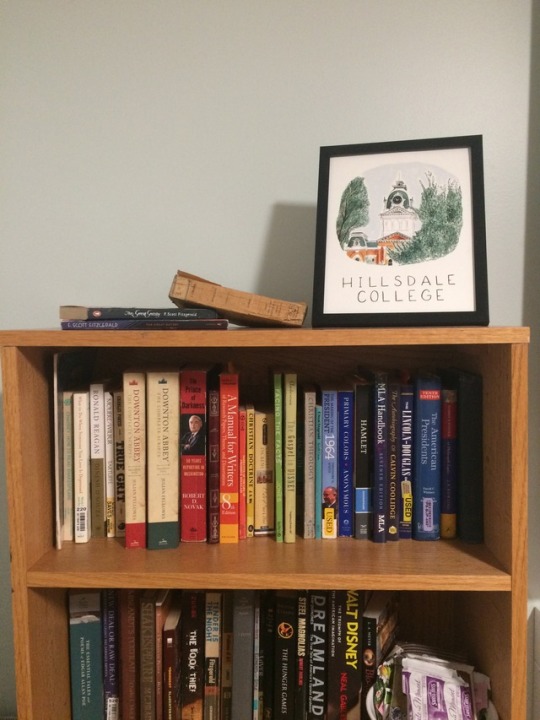

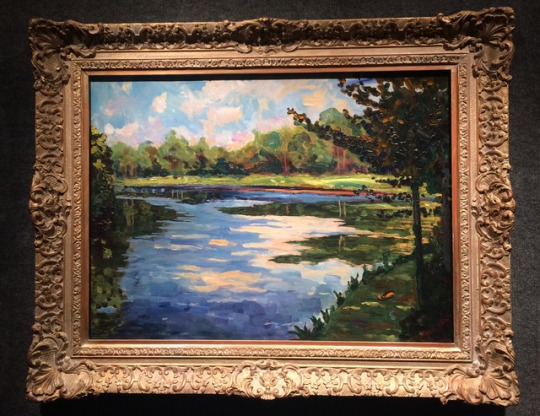

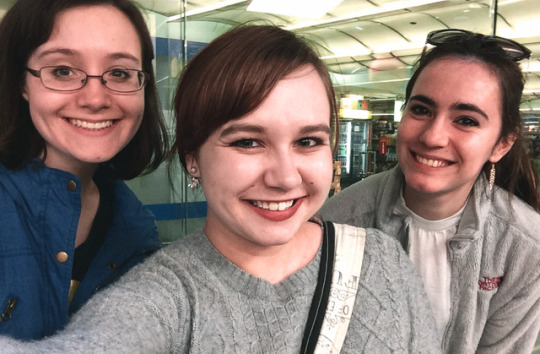
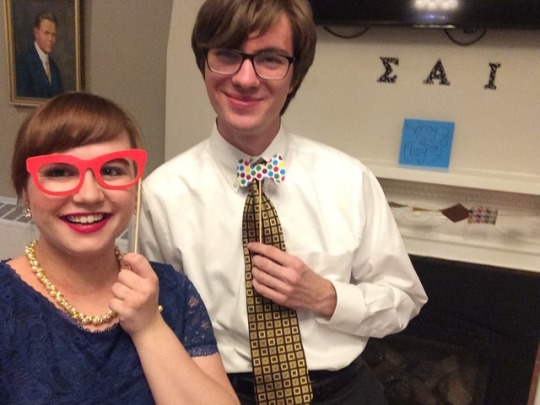


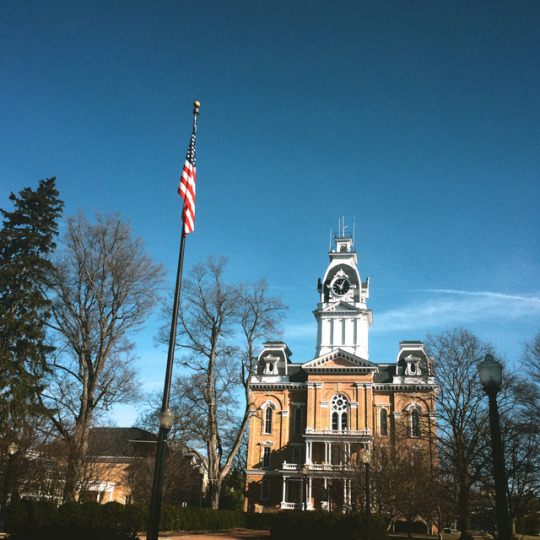

Spring 2017- The Semester So Far
I started writing this post back in February. And then I lost it because I couldn't remember what app I wrote it in. So yea, this is a pretty late time in the semester for a "mid-semester review," and may end up being more of a final overview. I'm okay with that.
In some ways, it feels like I'm still getting into the swing of things, so it can be hard to believe that I've been here for a month already (at least, I had in February). In other ways, it's like I never left.
Classes Overview:
Renaissance - Dr. Gaetano
It's a good thing that Dr. Gaetano warned us about all the reading we would have for this class, because yea, it's a lot of reading. But it's all good stuff. We started the course talking mostly about understandings of the Middle Ages, and now we've been focusing on writings on education. I guess the question of what makes up a good education has been on my mind a lot lately, so it's good for me to think about it in the scholastic/humanistic contexts. And, of course, I love history, and I like studying how people thought.
Intro to Journalism II - Mrs. Servold
This is just like Intro to Journalism I but better. The focus is on feature and opinion writing. I like both of these better than news reporting, because even though interviews and research can be fun, I'm getting tired of the strict formulaic writing that comes with it. Features and op-eds are much more fun, and we've read some pretty great examples so far. This was the only midterm I've ever gotten higher than 100% on, which is just another reason I like this class.
Intro to Psychology - Dr. McArthur
I signed up for this class last semester and dropped it after about a week because it was so much reading. Which it is. Most of it is pretty easy to understand, though. We recently (in February) finished the Biology section, which I'm glad about because I have a really hard time remembering that stuff. Much of my time on this class has been dedicated to a group project. We were supposed to present last week, but hadn't actually done our experiment yet. That's mostly due to my professor's inability to respond to emails in a timely manner, so luckily she doesn't mind us presenting late. The plan now is to do the experiments this week and present on Thursday, so I'll have to let you know how that goes. It's frustrating that it's taking so long, so it will be good to have it over. UPDATE: we finally did the experiment and it was super fun. We went to the preschool to test children's understanding of conservation. So for instance, I had two identical glasses with equal amounts of water, but once I poured one into a beaker, the kids thought the beaker suddenly had more water. Silly children. They don't understand that just because something changes shape doesn't mean it changes mass. Adorable.
US & the World Since WWII - Dr. Moreno
It's hard to say exactly what I think of this class. We're covering a lot of material without going very in-depth, which you pretty much have to do to cover so many events in one semester. So I think I'm learning, but I feel like I could be learning better. Part of that is from putting off reading in order to focus on an upcoming paper (and other homework), so I'll be able to get on that next week. UPDATE: I've now had two papers in this class and I felt good about both of them. The first was on Dr. Spock's Baby and Child Care, and the second was LBJ's Howard Commencement Address. We don't choose our own topics, which is unusual, but it's worked out.
January highlights:
My dorm, Mauck, was redecorated over the summer/fall! And it's lovely. My room is big and blue and adorable. It's nice to have such a fancy dorm with air conditioning and all kinds of important things.
The improv group "Broadway's Next Hit Musical" came to Hillsdale and performed songs based on audience suggestions, one of which turned into a full musical. It was hilarious. They really did their research, too, and made some very Hillsdale-specific jokes (i.e. "Hillsdating), which added to the charm.
I started taking voice lessons (in addition to guitar still) for the first time since second semester freshman year. I'm really enjoying it! I have the same teacher, Kristi Matson, who I had before, and I like her a lot. I had this "irrational" fear beforehand that she'd try to convince me I'm actually a soprano instead of an alto like I've always sung, which turned out to be a perfectly rational fear. But I'm liking those high notes much more than I thought I would.
A friend approached me over Christmas break about helping him edit/upload online-only pieces for the Collegian website, so I started doing that. The section is called Study Break, and we cover a range of topics, from op-eds to fun listicles or other features. I really like editing! And it's good to know the ropes of the website.
February highlights:
I started a radio show! Well, my friend Sarah Schutte asked me if I was interested in co-hosting a show with her about the history of Hillsdale College, and obviously heck yes I was. Now, we record two three-and-a-half minute clips a week with fun facts and anecdotes. You can hear episodes of "Wait, What Happened?" on Radio Free Hillsdale 101.7 FM (also SoundCloud).
I met a Hillsdale alumna named Joy Pullmann, who is both an editor at The Federalist and a homeschool mom, so basically who I plan to grow up to be. Which I told her, and then she asked if I wanted to write for her. Which obviously heck yes I did. Here is a piece I sent her!
Somehow, I wrote in my planner that I had a midterm on February 9. Felt very unprepared. Realized 30 min before that it was on March 9. Relief.
Every year, the ladies of SAI call people and perform "Singing Valentines" around Feb. 14. It's always a good time. Sometimes people request really weird songs, which adds to the bizarreness of the whole situation. I called my mom and we sang "My Heart Will Go On," which apparently my dad wasn't thrilled with because she kept singing it all day.
I got an email from George Angell of the theatre department asking if I was planning to audition for the upcoming play he was directing. I wasn't, but he said he had me in mind for the female lead. All year, I’ve had this idea that if someone specifically asked me to audition for a play, and wanted me for a challenging role, then I'd do it. So that's what happened! Now I'm playing Doctor Mathilde von Zahnd in Durrenmatt's The Physicists. It's quite a show. I'll have to write a whole post about it later, for fear of spoilers. We open on Wednesday!
I went to Jilly Beans- this cute little coffee shop in town- with friends to celebrate my 22nd birthday! It was a lovely time.
My friend Sarah and I decided to pick up a little (as in, little sister) together in SAI. Unfortunately, the girl we chose ended up deciding not to join after all, which was a bummer. But, there's still next semester.
March highlights:
Mom and dad came for Parent's Weekend! Normally, they come in the fall, but my mom wasn't able to take work off. They got to see the new Mauck, meet our professors, and hang out with us. Mom ended up sticking around a few extra days and visiting classical schools, then she and I flew home together for spring break.
We all saw the musical "Kiss Me, Kate" that the theatre department performed. It was very cute and super well done.
We also saw paintings by Winston Churchill on display in Sage.
Hillsdale went on lockdown after a former student called in a threat. It was a little scary, but no one ended up being in danger. The student was caught that same afternoon. Certainly a strange experience.
We had SAI formal in the Mauck Solarium. I took my friend Noah. It was really fun! We mostly played card games and Bananagrams. And experienced a modern day photobooth- a selfie stick and props.
April highlights:
I attended Opera Workshop. The show consisted of different songs from various operas all centering around madness and death. It was really good, though pretty long.
I wrote an op-ed on why Hillsdale students should read up on the history of the college.
The SAI concert! It was fantastic! At least, I think so. Here’s a full video.
and here is where I am:
Blue Skies
Fairest Lord Jesus
Depreston (solo) thank you Dani and Giannina!
Touch the Sky
Another day of Sun (solo)
I went to Chicago with some students and professors from the History department. I'd never been before, and it was really cool! I mostly stayed with my friends Mary and Patience from SAI, and we wandered the Field Museum, the Navy Pier, and other cool historic spots.
The theatre honorary (APO) had an initiation, which was theatrical as always. I now have an APO little- my friend Jonathan Henreckson. His girlfriend is my APO big, Elena Creed, and together they consider themselves Regan's parents. So we have a bizarre little family situation going on.
I stayed on campus this Easter, which I somehow didn't realize was an option until this year. It ended up being a great call. I got some work done, got to relax, and went to my home church here (Countryside) with Regan and Matthew.
I'm sitting in a brand-new coffee shop called Rough Draft. It's charming and the coffee is very good. I plan to spend lots more time here.
Looking forward:
It's hard to believe the semester is almost over. Finals week will be here before I know it.
Right in the middle of finals week is the performance of Shakespeare in the Arb's Taming of the Shrew. I joined the crew last semester as the graphic designer, and somehow found myself with two small roles as well. I think it will be a good show. We've certainly put a lot of work into it.
In my penultimate semester, I will be taking:
Constitutional Convention – Rahe
Ancient Rome – Calvert
Biology (Human) – Johnson
Philosophy of Education – Beier
Voice – Matson
And of course, more writing for the Collegian.
I don't actually believe that I only have two more semesters. Maybe it will hit me soon.
0 notes